This is what happens when you mix Education with Steemit
Today I had to submit my last assignment for this year. What a wonderful feeling it is to be over and done with assignments, knowing that all has been submitted and that there is still one whole month before the exams available for preparation.
I have to admit that I had a hard time today to get all of my questions organized. I could not focus as I have so many things going on inside my mind at the same time, but at the end of the day I am happy with my answers and glad to be rid of it. This particular module is called "Child development" and it falls under the faculty of Educational Psychology.
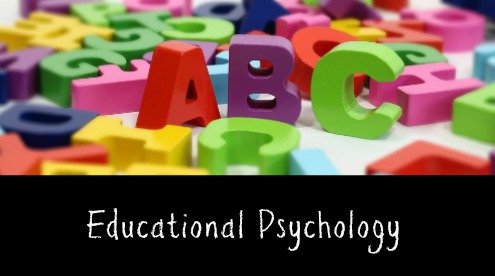
It's all about how children develop, but today's questions were all based on adolescents. I am honestly not very clued-up about teenagers and I usually try to avoid them as they scare me! Today, however, I did not have a choice. I want to share one of my questions today with @steemiteducation seeing as it fits right in with the educational theme.
This was one of the questions:
My first thought was obviously a swear word!
There were probably only 2 pages about Piaget's Formal Operational thought in my textbook and I panicked because I can't copy from there or anywhere else. I had to discuss this topic on my own, using my own words and try to do it to make up for 30 marks.
Why should it scare me to discuss a topic on my own?
Game on!
During the Formal Operational thought that children enter around the ages of 11 or 12, Jean Piaget describes them as developing their abstract, scientific thinking and they also start to think logically about possible occurrences. He differentiates between four newly acquired ways of thinking:
1. Abstract thought:
In this phase, adolescents are able to think abstractly about abstract concepts and they are able to understand abstract relationships, for example:
- They reason about what the real difference is between love and hate and can come to a conclusion about what they perceive to be the difference between those two relationships.
- They realize that they differ from their friends and begin thinking critically about themselves (something that did not bother them as much during the concrete-operational phase).
- They are more time-conscious and are now capable of projecting into the past and the future, making them able to create new and original situations.
- They now think and reflect about their own ideas and try to see how others come to think about their own, individual ideas.
- They become so aware of themselves that they imagine others to be just as aware of them. This type of thought is egocentric and as an expansion of this view of Piaget, David Elkind (1967, 1985) divided this thought into two images of the relation between self and others, namely:
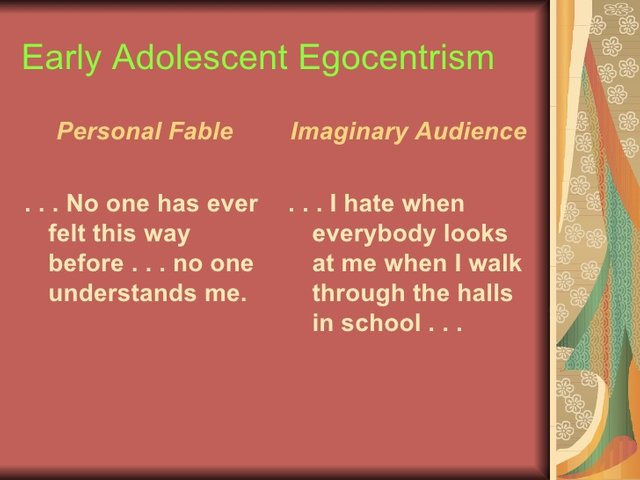
Source
2. Propositional thought (The real compared to the possible):
According to Piaget, this is the primary characteristic of the Formal operational phase – the possible being primary and the real being secondary.
Formal operational thinkers are now able to evaluate the logic of propositions or verbal statements without having to refer to real-world situations:
- They can think and compare. “Can” and “maybe” is now a possibility to what they want to refer to.
- They become analytical and understand that reality isn’t the only possibility.
- They take longer to reach certain decisions as their thoughts expand and they try out different problem-solving methods.
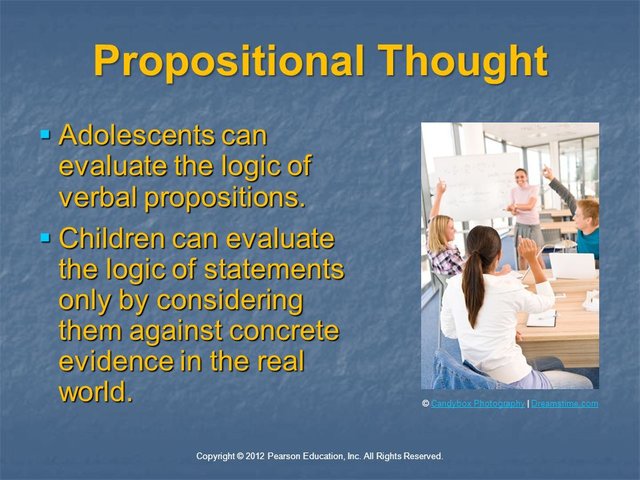
Source
3. Hypothetical-deductive / Combinatory thought:
This type of thought can isolate all the variables involved in solving a problem systematically and they now have the cognitive ability to develop alternative ways to solve a problem. They are able to reason from the general to a specific and is also able to come to a conclusion without being asked to do so.
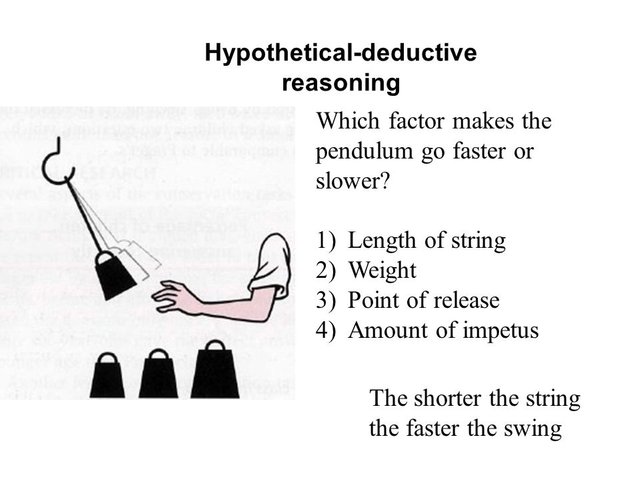
4. Inter-propositional thought:
This type of thought can test for logical consistency and it creates the ability to identify inconsistencies between statements or propositions. It enables the adolescent to test statements and to conclude that they are not invariably true.
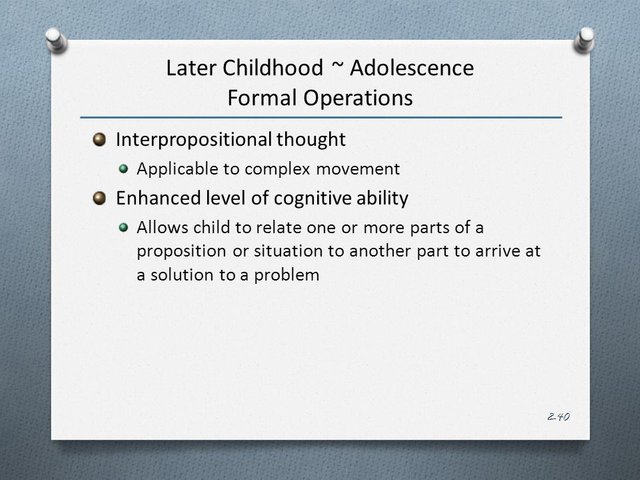
These four types of thought is evidence that thinking starts to happen in complex ways which does not happen suddenly, but rather as a continuous process. From thinking and reasoning about only one concept at a time, they gradually think and reason about more concepts at the same time. They no longer accept that things are just the way they seem but tests it to find their own evidence.
Teachers can be very useful during this stage of development and these are some guidelines for teachers teaching adolescents functioning in the formal operational stage:
- Teacher should start at a place that is familiar to their previous thinking and build on that to reach more abstract reasoning.
- The teacher could expose learners to many different experiences. This way, not only their thinking expands, but it also promotes developmental thinking to become more flexible.
- Discovery learning can be used as a tool – this way, students find things out for themselves, discover new things and becomes able to solve problems on their own.
- Learners will no longer just accept the teachers’ word as the only truth, thus it is important to illustrate, using concrete examples for them to accept and understand abstract relationships.
- The use of Audio-visual aids is one of concrete-operational teaching strategies. Teachers should not stop doing this as it will help learners to newly found information with those information that they already know.
- Teachers should provide thinking material like brainteasers, riddles, and games that require logical and analytical thinking.
- Encourage learners to solve problems using different methods and to incorporate it with critical thinking and scientific reasoning.
Bibliography:
Gouws, E. 2015. The Adolescent - 4th Edition. Cape Town: Pearson


Team South Africa banner designed by @bearone
I hope you got a good mark for that ^^
I hope so too @lemouth, lol.
Thanks =)
Please let us know :)
She will get a good mark...she always does!!! She is very clever! lol!
Is she one of your students, by any chance?
Lol. No, she's only my Steemit teacher. @giantbear and I used to be teachers at the same school years ago. I'm studying again now and share my results with her.
Ahah I see :)
I most certainly will ;)
It's been a long while since I did a masters and yes, nice article. To be sure, the are critiques and extensions of Piaget. I like the part where you imagined 30 to be $30. LOL $$$.
Hehehe, it gives me a little inspiration! Hocus Pocus Steemdollar Focus
=)
Puts you in the right locus.
Studying, running a home and keeping grounded. Your plate is full, good luck with the exams.
Yup, that about sums it up. My plate is overloaded with lots more at the moment, lol.
Thanks @joanstewart
Congratulations! This post has been upvoted from the communal account, @minnowsupport, by bdmomuae from the Minnow Support Project. It's a witness project run by aggroed, ausbitbank, teamsteem, theprophet0, someguy123, neoxian, followbtcnews/crimsonclad, and netuoso. The goal is to help Steemit grow by supporting Minnows and creating a social network. Please find us in the Peace, Abundance, and Liberty Network (PALnet) Discord Channel. It's a completely public and open space to all members of the Steemit community who voluntarily choose to be there.
This post has received a 0.31 % upvote from @drotto thanks to: @banjo.
Good work and all of the best